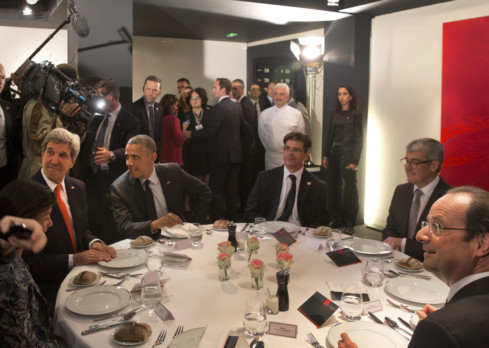
President Obama’s second-term staffing was always going to be a risk. He abandoned his first term’s team of rivals for a closer-knit team of loyalists. The bet was that he was assured enough in the job to no longer need the in-house challenge — and that smooth-running consensus would compensate for the loss.
The bet isn’t paying off. Overseas and at home, the administration seems besieged and befuddled. Obama is in danger of cementing an image of haplessness, which would be hard to undo.
The administration was surprised when Russian President Vladimir Putin swallowed Crimea. It was caught flat-footed by the crumbling of Iraq and emergence of an Al Qaida state. Now the region is “a cradle of violent extremism,” Obama’s attorney general said last week. But the president is uncertain how to respond.
Increasingly friends and foes around the world seem comfortable disrespecting the United States. In Egypt, a court sentenced journalists to prison hours after Secretary of State John Kerry left Cairo expressing confidence in the government’s commitment to democracy. US ally Bahrain, home to the Navy’s 5th Fleet, expelled an assistant secretary of state. Days after Obama visited the Philippines to support rule of law in the South China Sea, China towed a massive oil rig into waters claimed by Vietnam and, Vietnamese officials said, intentionally rammed two of their ships.
Failed peace bid
Obama visited Berlin in 2008, promising to build bridges between continents that had “drifted apart” in the Bush era. Now Germans are furious at the United States for spying on them. Myanmar, which Obama recently claimed as a foreign-policy success, last week sentenced four journalists to 10 years of hard labour, one of many signs that reform there has stalled or worse. China barred a US scholar from visiting and rounded up dissidents immediately before last week’s US-China strategic and economic dialogue. Israel and Hamas are drifting toward war, after Obama’s second failed effort to broker a peace accord.
At home, the administration seems equally taken aback by the thousands of Central American children flooding across the Southwest border. It sends mixed signals on whether it wants to change the asylum law in response. In the most elementary sort of staffing snafu, the president found himself needlessly on the defensive during a trip to Texas because he refused to visit the border.
Meanwhile the White House message varies by the day. Growing economic inequality, which last December Obama said “challenges the very essence of who we are as a people,” now is rarely mentioned. There seems to be no strategy to propel objectives the White House had set forth as fundamental: immigration reform, trade deals with Asia and Europe, investment in education and infrastructure.
Obviously these disappointments don’t all reflect poor staffing. Even the best-oiled, most high-powered administration might not bend John Boehner or Putin to its will. Obama is hardly the first president frustrated by Israeli- Palestinian intransigence.
But Obama should be asking whether his team is making the best of whatever difficult circumstances it cannot control. More than half of his second term stretches before him. Some things — notably the economy — are looking hopeful. It’s too soon, and it would be too dangerous for the country, to settle for the current state of affairs.
In his first term, Obama surrounded himself with people with the independence and self-confidence to debate him and each other: his primary opponent Hillary Clinton as secretary of state; his predecessor’s defence secretary, Bob Gates, staying on at the Pentagon; the formidable Richard Holbrooke coordinating Afghanistan-Pakistan policy; a former four-star general, James Jones, as national security adviser; Leon Panetta and David Petraeus at the CIA. Chief of staff Rahm Emanuel had his own base and history in the House of Representatives; Tim Geithner, Treasury secretary, had his in the New York Fed. Some performed better than others, but together they guaranteed the White House would not be an echo chamber for the president’s views.
Many of their places have been taken by people who are no less honourable or hard-working, but for whom loyalty to the president may come first, and who were chosen in part for seeing things as he does. Will Defence Secretary Chuck Hagel, Obama’s pal from Senate days, or Chief of Staff Denis McDonough, his aide from the same era, question the president’s world view, or tell him that fundamental change is needed, as Gates or Emanuel might have?
As second-term critics circle like sharks, it’s natural for a president to surround himself with admirers and defenders. But what a president needs are people who will challenge his thinking and, when necessary, tell him news he would rather not hear.
— Washington Post










